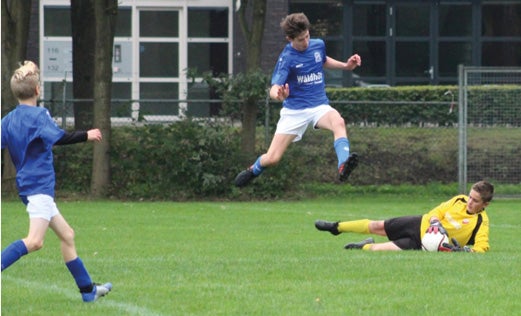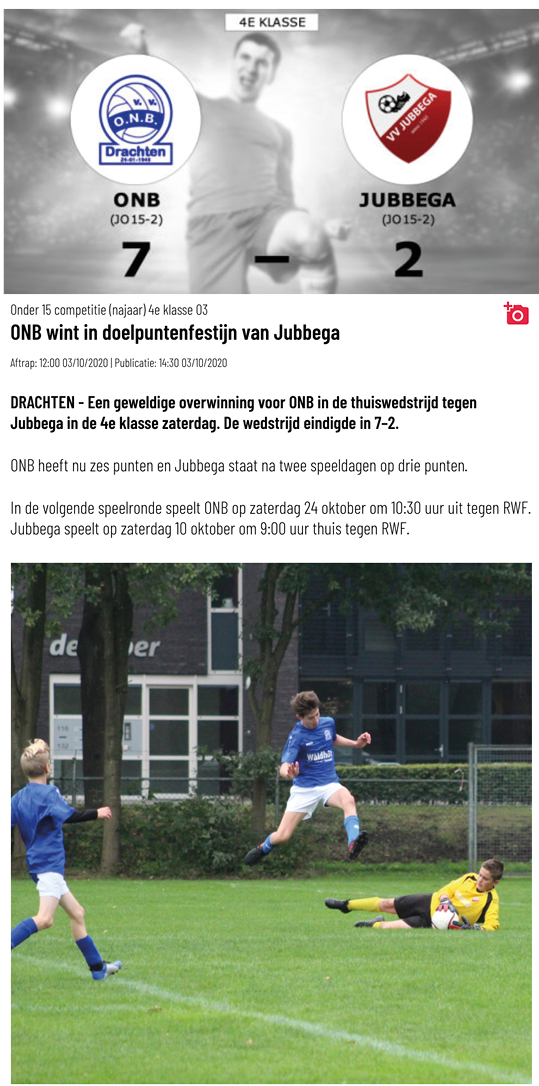
Dutch regional media group NDC is planning to up its game when the first post-Covid football season kicks off after summer. The publisher’s reader promise: to cover every single local match for the entirety of the season.
“For a regional publisher like us, being able to cover all matches of all divisions is engagement gold,” says NDC Sports Product Manager Ard Boer. And how do they plan to do it? By using robots and crowdsourcing.
The Netherlands is a football-playing country – 1 million of the 17 million inhabitants belong to a club. Early on during the pandemic, regional news publisher NDC saw how the local sports communities were impacted and spotted an opportunity for the first post-Covid season. The media company will do something no one else in the country has attempted – cover every single local match for the whole season. That’s 60,000 football games – a commitment far beyond the capacity of the newsroom. The solution: robots will write the match reports, while photos and comments from coaches will be collected through a crowdsourcing platform.

Article produced as part of NDC’s automation test project in 2020, with crowdsourced photos
The crowdsourcing platform is developed by NDC with support from Swedish news automation provider United Robots, which already operates a similar service in Sweden, whereby team coaches are prompted to comment via text message after each match. In NDC’s case, the platform will allow coaches to comment as well as provide data about goal scorers and will allow both coaches and others around the pitch to upload match photographs.
The reader promise of covering all local football in the regions of Friesland, Groningen and Drenthe (1.5 million inhabitants) is all about reader engagement. NDC will offer unique journalism which will give local communities – teams, players, coaches and fans – a stake in the sports reporting.
Says Ard Boer: “Thanks to automated journalism, we’re able to write about every single local football match, coverage that’s not provided by anyone else. That, combined with the crowdsourcing element, will drive inclusivity and engagement in the local sports communities, and by extension create value in our news brand.”
The engagement generated will not just strengthen NDC’s three local journalism news brands, it will also underpin the publisher’s reader revenue business. While the local matches will be free to read, the automated content will be combined with premium sports journalism to drive people down the funnel.

NDC Sports Project Manager Ard Boer
How robots help publishers connect with people. NDC is the most recent in a growing group of news publishers who automate local sports reporting in order to be able to cover all matches, all of the time. It may sound somewhat contradictory that robots now play an active role in creating journalism that involves hundreds – thousands – of people that were rarely seen in local news stories before.
But the fact is, they do just that. There is plenty of evidence from local publishers of how this works.
Helena Tell at Bonnier News Local title Bärgslagsbladet in Sweden says that automated match reporting means clubs and fans get the attention and the information they hunger for, without impacting journalists’ time in her newsroom. At EverySport Media Group, also in Sweden, they see that local sports articles often go viral in small clusters which means the publisher reaches big audiences at hyperlocal level.

Editor-in-Chief Helena Tell at Bonnier title Bärgslagsbladet, which publishes automated sports and real estate content
None of the local media companies mentioned above actually built any newsroom robots.
That job was done by United Robots in Malmö, Sweden, whose robots have generated and distributed over 4 million news texts to some 100 news publisher sites since the company launched in 2015. And while United Robots take care of the tech development, each publisher is involved in training “their” robot to write to their editorial style and guidelines. Once that is done, the vast majority of the content generated by the robots in Malmö, is sent straight to readers on publishers’ sites and apps, involving no manual tasks.
With robots working in the newsroom, publishers can provide readers with reporting where previously there was none. It takes robots as long to write 1 text as 100, so they can generate great volumes of stories quickly, based on local data on topics like sports or real estate sales. This allows even small local publishers to serve readers with new, extended coverage, including at hyperlocal level. Automatically, and with no impact to journalists’ time. That is the real value of automated journalism.
*This article was produced in association with United Robots, a trusted Press Gazette commercial partner. To find out how United Robots can help expand coverage in your newsroom contact them to request a demonstration.
Email pged@pressgazette.co.uk to point out mistakes, provide story tips or send in a letter for publication on our "Letters Page" blog
